Each year, HRE unveils its HR Honor Roll–a group that now includes 30 recipients who have demonstrated excellence and leadership in the field of HR. The 2018 winners represent a range of experiences and have brought unique strengths to their respective organizations; however, they share a common commitment to making HR innovation a driver of company success.
This year’s winners are: Dave Kozel, executive vice president and chief HR officer at PVH Corp.; Gale King, executive vice president, chief HR and chief administrative officer at Nationwide; Kevin Silva, executive vice president and chief HR officer at Voya Financial; and David Almeda, senior vice president and chief people officer at Kronos Inc. The following profiles explore how each HR Honor Roll inductee has helped redefine HR leadership:
Scaling Success with Inclusion and Employee Growth
Dave Kozel says the company he joined 15 years ago–PVH Corp.–bears little resemblance to the organization it is today. The clothing wholesaler and retailer grew from 7,500 employees in North America to 36,000 associates worldwide by acquiring global lifestyle brands that include Calvin Klein, Warnaco and Tommy Hilfiger.
In the early days, Kozel says, PVH’s HR function reflected a decades-old personnel department that focused on administrative transactions. Its HR systems were antiquated, an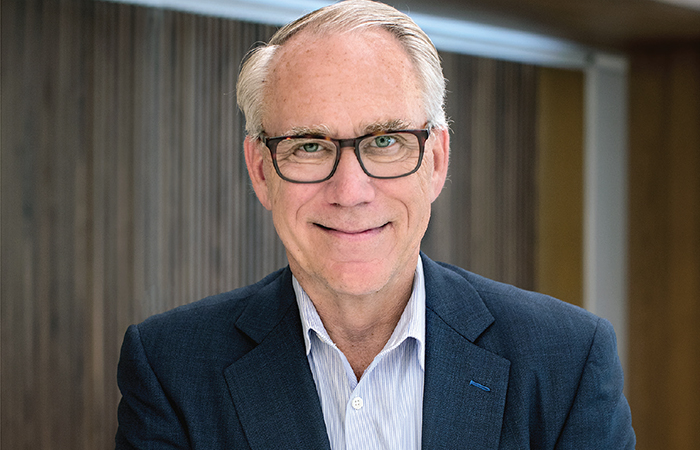 d employee training was minimal. Even its internal communication strategy was practically null and void.
d employee training was minimal. Even its internal communication strategy was practically null and void.
Since then, the HR and communication functions have evolved, reflecting a 21st-century workplace. Under Kozel’s guidance, a results-based HR function was built that values inclusion and diversity and supports a variety of communication tools such as an intranet. Hundreds of training opportunities exist for every employee at every level. HR also conducts employee surveys about staff needs and desired changes. Despite these massive improvements, Kozel says, he never considered himself an “HR person,” but rather he simply focused his energies on helping the company be successful.
Employees Rule
The catalyst behind most of these HR changes has been employee feedback from the company’s optional, biannual surveys, says Kozel, adding that the global response rate averages 86 percent. The results are disseminated to senior executives, who are mandated to share them with their department or staff and develop a global action plan to address each key issue.
While Kozel has coached her on the company’s “long game” of building critical employee programs, among Jernstedt’s favorite stories invol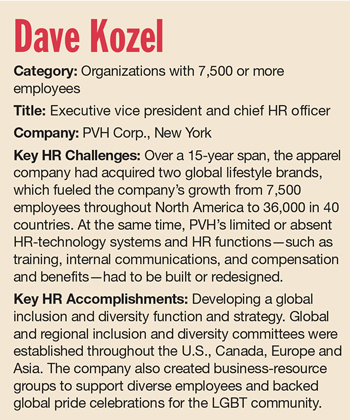 ves his commitment to employees, including the 200 associates who lived in Puerto Rico when Hurricane Maria slammed into the island last year. She says Kozel mobilized his HR team and company leaders to fundraise, ending up with $450,000 through employee donations and company-matching funds. PVH then partnered with charitable organization E4E to distribute the emergency funds to these employees, who were still receiving PVH paychecks even though their workplace was destroyed.
ves his commitment to employees, including the 200 associates who lived in Puerto Rico when Hurricane Maria slammed into the island last year. She says Kozel mobilized his HR team and company leaders to fundraise, ending up with $450,000 through employee donations and company-matching funds. PVH then partnered with charitable organization E4E to distribute the emergency funds to these employees, who were still receiving PVH paychecks even though their workplace was destroyed.
Due to Kozel and his HR team’s efforts, PVH has grabbed national attention.
In 2016 and 2017, Forbes named PVH to its “America’s Best Employers for Diversity List.” The company also earned 100 percent on Human Rights Campaign’s Corporate Equality Index, which rates LGBT policies and programs, during those same years. This year, it was ranked among the top 100 most inclusive and diverse employers globally on the Thomas Reuters Global Inclusion Index and named one of Forbes’ and Just Capital’s “Most JUST Companies.”
Just Doing My Job
The list of Kozel’s accomplishments goes on and on, which stems from his rich HR background. He earned a master’s degree in industrial relations from the University of Illinois and previously served as executive vice president of HR for J. Crew Group Inc., vice president of HR at Grey Advertising and Deluxe Electronic Payment Systems, and senior HR director at Citicorp Consumer Credit Services.
As an HR leader at PVH, he has encouraged senior leadership to participate in a training session–Confronting Unconscious Bias–and created two employee-retirement plans: a 401(k) and a fully funded, open-pension plan. For Kozel, diversity and inclusion aren’t part of a checklist; they have real meaning. For the past two years, the company has been a platinum-level sponsor for the New York City Pride March, which celebrates the LGBT community.
Still, Kozel says, his achievements are simply part of his job, or an evolutionary process he calls “continuous improvement.”
“I’ve always looked at myself as being responsible for human capital and ensuring that the workforce, the cost of the workforce, the complexion of the workforce, meets the needs of the businesses I’ve supported,” he says. “I’ve been able to do this successfully in many different industries, in many different ways, for many years.”
A Champion for All Employees
For Gale King, the key to solving the employee-happiness equation ultimately comes down to just two variables.
“In the end, people care about whether they feel valued by the organization, and whether they have opportunities to grow with you,” says King, executive vice president and chief HR and chief administrative officer at Nationwide.
“No matter who you are, you want to feel proud about what you do, and you want feel that the company is invested in you,” adds King, who oversees the Columbus, Ohio-based insurance provider’s HR, corporate-real-estate, security and aviation functions, with responsibility for roughly $1.1 billion in operating budget and benefits expenses.
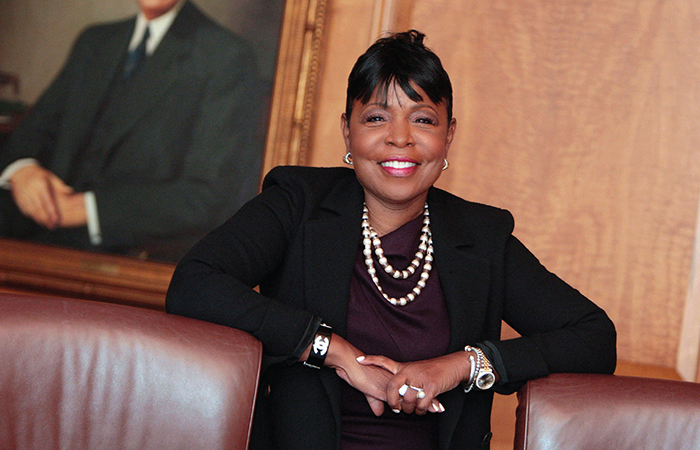 King, who became Nationwide’s CHRO in 2009, has been instrumental in ensuring that employees are engaged and fulfilling their goals. For instance, she instituted an annual engagement survey (which boasts a 98 percent participation rate), periodic pulse surveys and leader scorecards in an effort to better measure engagement and performance. When King arrived, Nationwide’s engagement scores were in the 49th percentile and now sit in the 74th percentile. Over that same time, the company’s revenue grew from $31 billion to $46.5 billion.
King, who became Nationwide’s CHRO in 2009, has been instrumental in ensuring that employees are engaged and fulfilling their goals. For instance, she instituted an annual engagement survey (which boasts a 98 percent participation rate), periodic pulse surveys and leader scorecards in an effort to better measure engagement and performance. When King arrived, Nationwide’s engagement scores were in the 49th percentile and now sit in the 74th percentile. Over that same time, the company’s revenue grew from $31 billion to $46.5 billion.
Putting Inclusion First
King has helped spearhead programs designed to enable Nationwide employees to build their professional networks and find mentors among the company’s leadership. For example, the company’s Touch Points Program was launched to provide top Nationwide talent with connections to the board of directors, CEO and executive-leadership team.
At the heart of such initiatives is Nationwide’s, and King’s, desire to intertwine diversity and inclusion with professional development.
In 2005, the organization established a formal D&I structure that has grown to include learning initiatives, such as required training on conscious i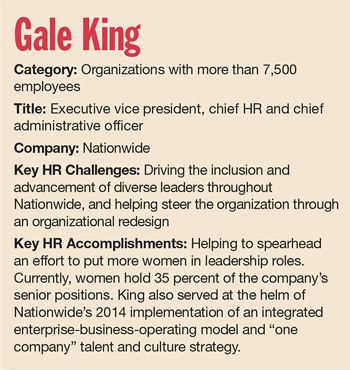 nclusion and inclusive hiring practices. Since 2009, King has helped expand the number of associate-resource groups to 16 within Nationwide, as well as grow to 18 the number of diversity and inclusion business councils, which are designed to support and promote a diverse and inclusive workplace across the business.
nclusion and inclusive hiring practices. Since 2009, King has helped expand the number of associate-resource groups to 16 within Nationwide, as well as grow to 18 the number of diversity and inclusion business councils, which are designed to support and promote a diverse and inclusive workplace across the business.
King has also been at the forefront of an effort to put more women in leadership roles through development programs, mentoring, sponsorship and transparent job posting. At Nationwide, women currently hold a number of C-level roles, such as chief governance officer, chief compliance officer, chief digital officer and chief technology officer. Overall, women make up 35 percent of the company’s senior-level leader positions.
“We knew that diverse and female leader inclusion would drive enhanced results, but more importantly, we want our associates to see that Nationwide has a culture where all could succeed,” says King, adding that diversity at the “senior-leadership and board-of-director levels also helps attract and retain strong talent.”
The company recently received the Catalyst Award, which recognizes extraordinary efforts to advance women in business. It has also been a recipient of LATINA Style’s Top 50 award, bestowed annually upon companies that the publication deems as the best places for Latinas to work, and earned a spot on the Human Rights Campaign’s Best Places to Work list for LGBT associates for 13 consecutive years.
Tackling Transitions
This award-winning organization, however, was in a transitional phase when King arrived.
In 2009, Nationwide brought in a new CEO. King and her HR team helped lead the company’s subsequent organizational redesign, in addition to serving at the helm of its 2014 implementation of an integrated enterprise-business operating model and its “one company” talent and culture strategy.
This reformation brought 14 company businesses under one brand, and necessitated restructuring the enterprise as part of the transition. The effort to “more efficiently and effectively go to market under one Nationwide brand required major business partnership and leadership by the entire HR team,” says King.
As part of the restructuring effort, the HR team worked closely with business leaders doing the organizational-design work–creating new organization structures, teams and jobs, and was instrumental in helping guide the workforce going through the change. This included one-company culture training, and collaboration, change management and new skills development in order to effectively operate across new businesses, King says.
This undertaking, she adds, required constant communication, as well as change management and culture training, including a series of programs designed to “refresh our values and [reinforce] what it means to be a Nationwider for leaders and associates.”
King’s guidance and efforts during this pivotal transition phase are among the indicators of the steady leadership she’s provided since taking the helm of HR at Nationwide nearly a decade ago, says CEO Steve Rasmussen.
“With responsibility [for] our entire workforce for the past nine years, Gale has, in partnership with the business, moved our company’s culture from typical to extraordinary,” says Rasmussen. “With the disciplined and intentional approach Gale has put in place, Nationwide’s progress as an organization has accelerated dramatically.”
Launching One Voya, A Culture Devoted to Employees
Kevin Silva recently uncovered a letter his 19-year-old self wrote to his mother, who was worried about his career path.
“I will do something meaningful in life,” he wrote. “Maybe one day I will get into personnel.” Years later, his words couldn’t be truer–he currently serves as executive vice president and CHRO of Voya Financial, which, for six years, he has steered through becoming a public company, three organizational-health surveys and plenty of transformational change.
In 2012, financial-services company ING U.S. was divesting its U.S. interests, which included retirement, life-insurance and asset-management divisions. Silva partnered with CEO and Chairman Rodney O. Martin, Jr. to examine all possibilities for the company’s future. Once it was decided that the best option would be going public–which it did in 2013, changing its name the following year–Silva was tasked with spearheading a culture makeover.
But it is his team’s creation of a Manager Effectiveness Index–which Ain believes “will help take Kronos to heights we’ve never seen before”–that Almeda seems most proud to talk about.
Building the Index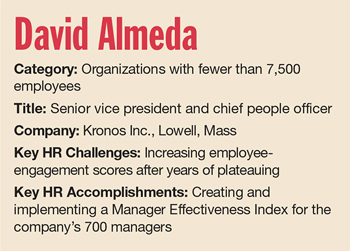
It all began after the rise in engagement scores, when Almeda started focusing on managers with the aim of “bringing their capabilities up.”
“The reason for the Manager Effectiveness Index was to institutionalize and put in clear accountability for managers,” Almeda says. “Up until that point, all we did was set a bar and draw a line in the sand relative to what we expected managers to do and how we expected them to act.”
The MEI “hardwired” that accountability across the organization and ensured all managers were measured with the same yardstick, he says. “And it gave us a way to determine which managers we needed to focus on to get them to do what we wanted them to do.”
Through performance reviews, leadership-goal ratings, focus groups and the company’s Courage to Lead award nominations–combined with external benchmarking with organizations such as Google, Facebook and Deloitte–Almeda’s team isolated four behaviors the best leaders share: communicating openly and honestly; empowering and enabling; developing and encouraging; and supporting the whole person.
Using those values, Almeda’s team recrafted the company’s biannual employee survey to include 16 areas for managers to be rated on, such as: “My manager makes an effort to get the opinions and thinking of the people in our workgroup,” and “My manager regularly shares relevant information from his/her manager and functional leadership.”
Once Kronos’ 700 managers receive their scores, they meet with their own managers to develop a plan to address any shortcomings, followed by a meeting with their team to discuss implementation of that plan.
“The MEI gives us another layer of important visibility into what effectiveness really means,” Almeda says. The index has already proven its worth, he adds, pointing to a 3-point increase in engagement scores in the past year alone. Almeda’s own MEI score is 99 percent, as evaluated by his direct reports. Meanwhile, the HR team’s overall engagement score, at 94 percent, is higher than the Kronos global average.
Investing in People
But running a highly regarded HR department means dealing with the occasional departure, such as two high performers who were recently lured away with VP roles in HR and talent management.
“You have to expect that,” Almeda says. “But every time someone leaves, it’s an opportunity to repurpose resources. And people come to [us] proactively, saying they’d love to be a part of [our] team, so there’s a plus to it as well.”
After a recent restructuring, Almeda–who also holds the title of senior vice president–is now one of three people who reports directly to the CEO, adding that he gets between two and three hours of face time with his boss every week.
“There are not a lot of CEOs who give you that kind of mission and encouragement,” he says.
So which figure is he more proud of: Kronos’ $1.3 billion in revenue or its all-time high employee-engagement score of 87 percent?
“I don’t know that I could separate those two,” he says. “I’m most proud of the fact that people get the connection between the two. HR has become a center of investment for the business, not just something you need to do to administratively maintain the business.”
As for the accolades that come with the work, Almeda says being named to the HR Honor Roll is “a team award.”
“The best thing I contribute sometimes,” he says with a laugh, “is to get the hell out of the way.”
No one would disagree with that statement more than Almeda’s boss.
“As CEO, I frankly receive too much credit for our success and for being known as a great place to work around the world,” Ain says. “The real hero of our performance has been our HR department and their leader, David Almeda. He has made HR a strategic asset for our business, and he continues to teach me so much every single day.”

